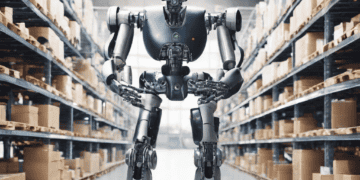Business leaders grappling with persistent supply chain challenges amid crises are increasingly turning to artificial intelligence (AI) as a strategic tool. According to a recent PwC survey, approximately 48% of business leaders are leveraging AI to steer supply chain decisions, with 54% intending to harness AI-driven simulations to augment their supply chain operations.
AI facilitates the simulation of extensive datasets encompassing suppliers, customers, competitors, and external variables like weather patterns and geopolitical events. This capability empowers leaders to forecast supply chain dynamics and disruptions more accurately, enabling the formulation of integrated, up-to-date business plans essential for navigating the intricate and rapidly evolving business landscape.
Embracing AI holistically brings forth three primary advantages:
Supply Chain Transformation: Companies adopting a comprehensive AI approach throughout their supply chains are approximately twice as likely to witness significant value derived from initiatives enhancing productivity, decision-making, employee and customer experiences, product/service innovation, among other areas.
Enhanced Decision-Making: A comprehensive AI approach amalgamates multifaceted observations and insights from internal and external realms, fostering scaled data processing and correlations across functions. This enables consistent strategic insights and facilitates prompt, business-oriented decisions leading to valuable outcomes.
Systems Modernization: Around 36% of companies taking a comprehensive AI approach plan to utilize it for establishing a data fabric, presenting a 360-degree view of all data interacting within their organizations. This approach aims to drive end-to-end value from crucial functions within the supply chain.
For leaders venturing into AI integration within their operations, there are five crucial priorities to emphasize:
- Efficiency and Long-term Thinking: Utilizing AI for decision-making aids in processing vast datasets, enabling estimation of potential outcomes concerning price changes, customer satisfaction, and product availability. This efficient analysis is pivotal for business leaders.
- Outcome-Centric Approach: Starting with desired outcomes rather than existing data helps in identifying and sourcing necessary data and analytics to support these objectives effectively.
- Actionable Data with AI: Employing AI to filter and extract pertinent data from disorganized systems assists in leveraging relevant information for practical use.
- Gradual Scaling and Focus: Initiating AI implementation on a small scale within specific business segments before expanding ensures a more manageable and effective integration process.
- Simulation Optimization: Leveraging AI-powered simulations enables modeling numerous supply chain scenarios, facilitating quick forecasting of potential events and strategizing actions before real-world implementation.
These simulations might also address talent challenges over time, aiding in recruitment, onboarding, and upskilling processes.
Furthermore, key strategies for maximizing AI’s impact in supply chain optimization include:
- Creating data insights platforms for automated data processing.
- Developing digital twins to contextualize data within business frameworks.
- Aligning employee goals and processes around impactful opportunities.
- Establishing measurable ROI through shared insights and best practices.
- Ensuring responsible AI deployment in compliance with regulations.
- Continuous governance of AI models and their impact on business strategies.
- Mitigating bias and ensuring fair treatment across stakeholders.
AI initiatives also pave the way for reshaping the workforce, addressing talent gaps, reducing turnover, and improving overall employee satisfaction through automation and upskilling efforts.
In conclusion, AI presents a real-time solution for supply chain professionals, streamlining planning and optimization processes from annual events to daily occurrences. The increasing adoption of AI in supply chain decision-making and simulations reflects its growing prominence in the industry. By embracing AI across supply chain transformation, enhanced decision-making, and systems modernization, companies can stay ahead in today’s rapidly evolving business landscape.
Stay updated with supply chain news at The Supply Chain Report. Learn more about international trade at ADAMftd.com with free tools.
#SupplyChainAI #AIInSupplyChain #BusinessLeadership #SupplyChainInnovation #AIDrivenDecisions #AIforBusiness #DigitalTransformation #DataDrivenInsights #SupplyChainOptimization #AIinBusiness #SmartDecisions #FutureOfSupplyChain #AIinOperations #TechInSupplyChain #AIAndBusiness #SupplyChainAutomation #AIIntegration #WorkforceTransformation #DataFabric #BusinessStrategy #SimulationsInSupplyChain #AIForDecisionMaking #SupplyChainLeadership #AIAdoption #SupplyChainResilience #AIRevolution #AIForEfficiency















